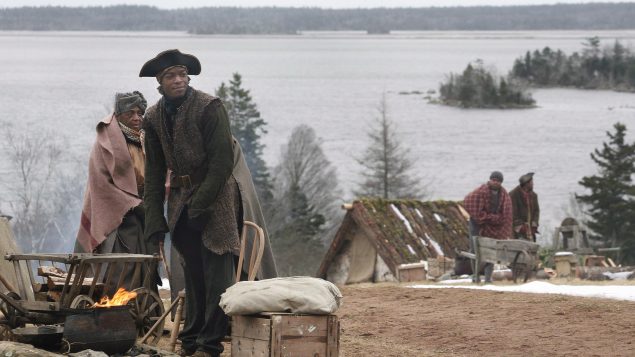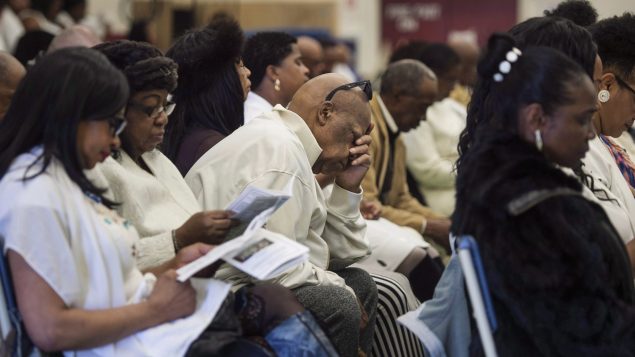Black families in Nova Scotia are among the original settlers of this country.
“Freedom and a farm”
During the American Revolution the first wave of Black Loyalists, who were then slaves in the 13 colonies the began the United States, came north lured by the British promise of “freedom and a farm”.
They served with the British forces and were settled on some of the worst land, but never received official titles to it, as the white settlers had.

Actors on set during the filming of “The Book Of Negroes” in Cole Harbour, N.S., on April 28, 2014. The six-part CBC miniseries was based on the book by Lawrence Hill, that tells the story of some of the early Black settlers. CP/Darren Pittman
A second wave of black refugees followed the War of 1812 and settled in Nova Scotia in similarly vague circumstances.
Over the generations, the families have paid taxes, and made requests of the government.
In 1963, the Land Clarification Act was supposed to rectify the precarious living arrangements.
Not much changed until a scathing UN Human Rights report in September 2017,
It outlined the neglect and systemic racism these families had endured over two centuries, and demanded both the provincial and federal governments act to make amends.
Tony Ince is Minister of the Public Service Commission of Nova Scotia and Minister of African Nova Scotia Affairs.
ListenHe represents the riding of Dartmouth, Cole Harbour, Portland Valley.in the provincial legislature.
He says he can’t say exaclty how many families are living without title to their properties, but two or three hundred is the rough estimate.
Ince, who is holding meetings in the various communities, in involved in the $2.7 million (Cdn) project to comply with the UN demands.
“What community members need to do is just simply contact the government if they have a concern about a land title, or anything to to with the land that they may be living on, and if they want us to walk them through the process, provide the legal counsel and even the surveying of the land, government will assist them and do that for them, and that is without cost to the community member,” Ince says.
He says many community members have misunderstood that money has been put aside.
“Racism, it’s so deeply rooted,,, It’s embarrassing and it’s hurtful”
But Elaine Kane told the CBC’s Anna Maria Tremonti in late September, she is still waiting to be able to move into her mother’s house, with the intention of raising her daughters there.
There was a pilot project in 2015 Ince says, that was not very successful. “we as government have learned that the process is a lot more complicated than the pilot project set out to do”
Ince says they are now “putting in place community navigators, a co-ordinator to oversee the whole project who will be in a position to visit families to discuss the process.
Departments are working together for the first time since the original attempt to right these wrongs in 1963.
I”We have more than 50 communities, African Nova Scotian communities within this province. Each has its own unique identity and circumstances, and even though I might be from a black community that’s linked to Africville, and close to that area, people in the other communities may not see me as understanding their processes or their concerns or their unique challenges that they’ve had, government-wise and socially” Ince says.
Professor Isaac Saney is teaching the first Black History course at Dalhousie University for the second time in this winter term.
In the same interview with the CBC’s Anna Maria Tremonti, he called the money allocated “a pittance” and he is not optimistic about the land clarification.
“Racism, it’s so deeply rooted”, he says. “It’s embarrassing and it’s hurtful”.
Tony Ince takes a more inclusive approach.
“We have to have a broader lens, from a community perspective and that being First Nations indigenous, the Acadians and the African Nova Scotians and the Gaelic, as the founding cultures of this province.”
Ince feels he has gained some trust in the community with the series of actions the government has taken over the last few years.
The land claims process is finally underway with financial and bureaucratic collaboration and the support necessary to complete the process, but disputes among family members can cause delays and divides that will prolong the process.
Ince is proud of Nova Scotia’s ruling Liberal party and defends their record. The Black Loyalist Centre was opened in 2015.
The government is moving forward on the land titles initiative, and he cites Premier Stephen McNeil‘s apology to the people still living who were former residents of the Home for Coloured Children.
Black History Month, often decried for its limited scope, is putting some long neglected historical wrongs in the spotlight.
Perhaps by next February the descendants of the original Black Loyalists and settlers will be living in titled properties, with access to the full rights and privileges that come with home owning.







For reasons beyond our control, and for an undetermined period of time, our comment section is now closed. However, our social networks remain open to your contributions.